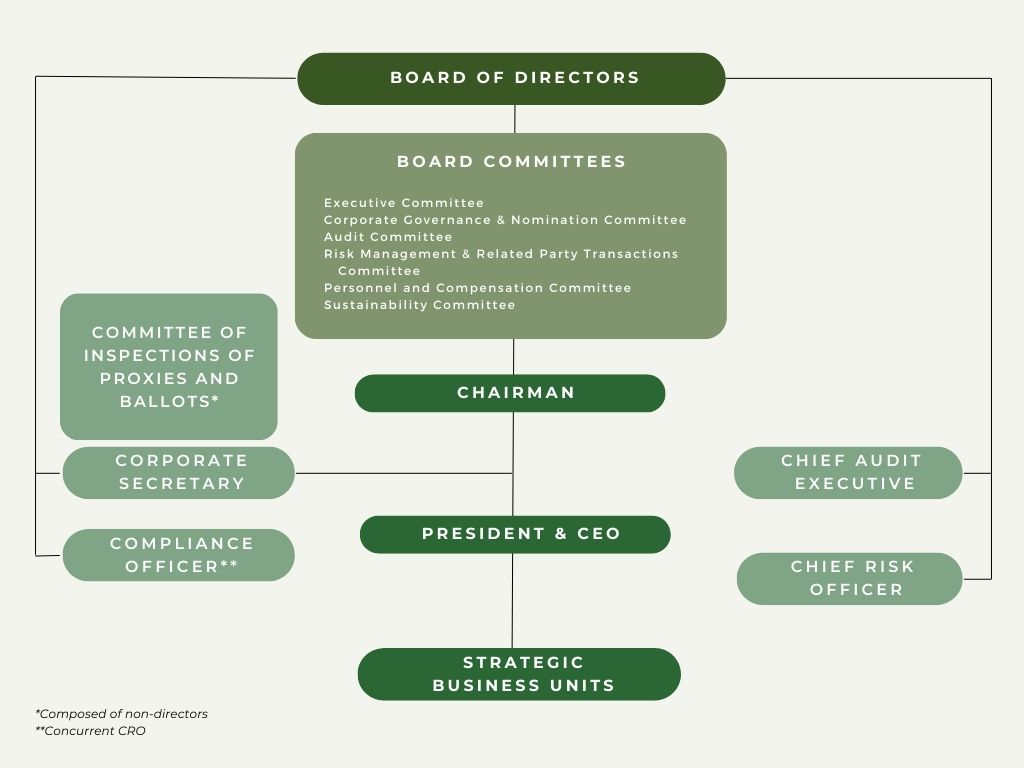CORPORATE GOVERNANCE
ALLHC is committed to the highest standards of disclosure, transparency,
and corporate governance in order to create and sustain shareholder
value, taking into account the interests of all stakeholders. ALLHC is
committed to doing business with integrity and in compliance with laws,
regulations, and best practices.
ALLHC is committed to the highest standards of disclosure, transparency, and corporate governance in order to create and sustain shareholder value, taking into account the interests of all stakeholders. ALLHC is committed to doing business with integrity and in compliance with laws, regulations, and best practices.
ALLHC's corporate governance practices are principally contained in our Articles of Incorporation and By-laws, and supplemented by its Manual on Corporate Governance. ALLHC follows the rules and governance principles implemented by the Securities and Exchange Commission and the Philippine Stock Exchange.

In compliance with best global practices and the Code of Corporate Governance for Publicly-Listed Companies implemented by the Securities and Exchange Commission, the Corporation has adopted a Manual on Corporate Governance.
Rights to Participate in Decisions Concerning Fundamental Changes
Shareholders have the right to participate in corporate decisions such as but not limited to:
a) Amendments to the Corporation's constitution;
b) Authorization of additional shares;
c) Transfer of all or substantially all assets, which in effect results in the sale of the Corporation; and
d) Approval of remuneration matters
Right to Vote in Shareholders' Meetings
All shareholders have the right to nominate, elect, remove and replace directors and vote on certain corporate acts in accordance with the Revised Corporation Code.
Any shareholder may nominate candidates for election as directors by sending a written nomination letter to the Corporate Governance and Nomination Committee, together with the written consent of the nominees, through the Office of the Corporate Secretary, within the deadline set by the Board of Directors and disclosed to the SEC and PSE. All nominations will be reviewed and deliberated upon by the Corporate Governance and Nomination Committee prior to endorsing the qualified candidates for ratification and approval of the Board.
The election of directors shall be by ballot. Each shareholder entitled to vote may vote such number of shares he or she owns for as many persons as many votes as are directors to be elected or may cumulate his or her votes for one candidate multiplied by the number of his or her shares shall equal, or he or she may distribute them on the same principle among as many candidates as he or she may see fit, provided that the whole number of votes cast by him or her shall not exceed the number of shares owned by him or her multiplied by the whole number of directors to be elected.
Electronic Voting
An electronic voting facility was available to the stockholders since the 2018 Annual Stockholders' Meeting. Voting and vote tabulation procedures are disclosed at the start of the meeting.
Voting in absentia
Stockholders who are unable to go to the venue of the ASM may vote electronically in absentia on the matters in the agenda upon registration and validation online. The requirements and procedure for electronic voting in absentia are included in the Notice and the Definitive Information Statement provided to the stockholders at least 15 business days prior to the date of the meeting and/or posted on the website of the Company and PSE.
Pre-emptive Right
All shareholders have pre-emptive rights, unless there is a specific denial of this right in the Articles of Incorporation. They shall have the right to subscribe to the capital stock of the Corporation. The Articles of Incorporation may also provide specific rights and powers of shareholders with respect to the particular shares they hold, all of which are protected by law so long as they are not in conflict with the Revised Corporation Code.
Right of Inspection
Shareholders shall be allowed to inspect corporate books and records including minutes of Board meeting and stock registries in accordance with the Revised Corporation Code and shall be provided an annual report, including financial statements, without cost or restrictions.
Right to Information
The Shareholders shall be provided, upon request, with periodic reports which disclose personal and professional information about the directors and officers such as their shareholdings in the Corporation, dealings with the Corporation, relationships among directors and key officers, and the aggregate compensation of directors and officers. The Information Statement which provide the information is distributed to the shareholders before annual general meetings.
The notice of the Annual and Special Shareholders' Meeting with sufficient and relevant information shall be sent at least twenty-one (21) days prior to the annual meeting and at least seven (7) days before special meetings. The notice of meetings shall be sent to all stockholders by electronic transmission, personal delivery or by such other manner as allowed by the SEC, addressed to the electronic or physical address of the stockholder registered in the books of the Corporation.
The Board shall make the results of the votes taken during the most recent annual or special shareholders' meeting publicly available the next working day. In addition, the minutes of Annual and Special Shareholders' Meeting should be available on the Corporation's website within five (5) business days from date of the meeting. The minutes document the resolutions, the voting results for each agenda item, and the directors members who attended the meeting as well as the questions asked by stockholders during the meeting and answers given.
Right to Dividends
Shareholders have the right to receive dividends subject to the discretion of the Board and the availability of unrestricted retained earnings. However, the SEC may direct the corporation to declare dividends when its retained earnings is in excess of 100% of its paid-in capital stock, except: a) when justified by definite corporate expansion projects or programs approved by the Board or b) when the corporation is prohibited under any loan agreement with any financial institution or creditor, whether local or foreign, from declaring dividends without its consent, and such consent has not been secured; or c) when it can be clearly shown that such retention is necessary under special circumstances obtaining in the corporation, such as when there is a need for special reserve for probable contingencies.
Appraisal Right
In accordance with the Revised Corporation Code, shareholders may exercise appraisal rights under the following circumstances:
- In case any amendment to the articles of incorporation has the effect of changing or restricting the rights of any stockholders or class of shares, or of authorizing preferences in any respect superior to those of outstanding shares of any class, or of extending or shortening the term of corporate existence;
- In case of sale, lease, exchange, transfer, mortgage, pledge or other disposition of all or substantially all of the corporate property and assets as provided in the Revised Corporation Code;
- In case of merger or consolidation; and
- In case of investment of corporate funds for any purpose other than the primary purpose of the Corporation.
Alternative Dispute Resolution Mechanism for Intra-Corporate Disputes
Any dispute, controversy or claim between the Corporation and its stockholders arising from, relating to, or in connection with the implementation of the articles of incorporation or by-laws, or from intra-corporate relations, except those involving criminal offenses and interests of third parties, may be referred to and resolved by arbitration under in accordance with prevailing Philippine Dispute Resolution Center, Inc. Arbitration Rules and SEC Rules and Regulations.
Shares and Voting Rights
It is the duty of the directors to promote shareholders' rights, remove impediments to the exercise of shareholders' rights, and recognize lawful mechanisms to seek redress for violation of their rights. They shall encourage the exercise of shareholders' voting rights. They shall be instrumental in removing excessive costs and other administrative or practical impediments to shareholders participating in meetings and/or voting in person. The directors shall pave the way for the electronic filing and distribution of shareholder information necessary to make informed decisions subject to legal constraints.
Notice of Meetings
The Corporation sends a notice to the stockholders of the date of meetings at least twenty-one (21) days before the scheduled date of meetings as provided in the By-laws. The notice of regular or special meetings indicate the agenda, the rationale and explanation for each agenda item, and sets the date, time, and place for validating proxies, which must be done at least five (5) business days prior to the Annual Stockholders' Meeting. Profiles of directors seeking election/re-election and auditors seeking appointment/re-appointment are clearly identified and indicated. A proxy form is attached in every notice sent to each stockholder.
Protecting Minority Shareholders
The Related Party Transactions Policy requires that all related party transactions between ALLHC, its subsidiaries, affiliates, and other related entities or persons are made on an arm's length basis at normal prices. To ensure that this policy is practiced and complied with, an assessment of related party transactions is undertaken.
The Board should, as far as practicable, give minority shareholders the right to nominate candidates to the Board of Directors. A stockholder may propose any other matter for inclusion in the agenda of any regular or special meeting, subject to reasonable advance notice and other guidelines as may be approved by the Board of Directors.
The Corporation may opt to hold fully virtual stockholders' meetings, subject to applicable laws, rules and regulations of the SEC, as may be amended from time to time. However, if stockholders holding at least ten percent (10%) of the outstanding capital stock ask for a physical meeting, the Corporation shall conduct a physical meeting unless prevented by existing rules and regulations.
Composition
The Board is composed of nine (9) directors who are elected by the stockholders owning majority of the Corporation's outstanding stock during the annual stockholders' meeting (ASM).
Election of Directors
The directors shall be elected by the stockholders owning majority of the outstanding capital stock of the Corporation at their annual meeting in accordance with the By-laws and the rules of procedure for annual meeting of stockholders. Pursuant to the Revised Corporation Code, any shareholder, including minority shareholders, shall have the right to nominate candidates to the Board. The list of names of the nominees to the Board, together with the written consent of the nominees, shall be filed and submitted to the Corporate Governance and Nomination Committee through the office of the Corporate Secretary on or before the deadline approved by the Board and disclosed to the SEC and PSE.
No person shall be elected director unless he holds at least one (1) share of stock in the books of the Corporation at the time of his election.
The election of directors shall be by ballot and each stockholder may vote such number of shares he owns for as many persons as there are directors to be elected or he may cumulate said shares and give one candidate as many votes as the number of directors to be elected multiplied by the number of his shares shall equal, or he may distribute his votes on the same principle among as many candidates as he may see fit, provided that the total number of votes cast by him shall not exceed the number of shares owned by him multiplied by the whole number of directors to be elected.
Directors shall hold office for the term of one (1) year or until their successors shall have been elected and qualified, in accordance with the By-Laws.
Board Committees and Charters
The Board of Directors has six (6) Board Committees. The members of the committees are appointed during the organizational meeting of the Board held after the ASM.
View the Board Committees and Charters >
Meetings, Quorum, and Attendance
At the beginning of the year, the Board designates the days when it shall meet, at least six (6) times each calendar year.
Members of the Board attend regular and special meetings of the Board in person or via teleconference or videoconference or by any other technological means allowed by the SEC.
Two-thirds (2/3) of the number of directors as fixed in the articles of incorporation shall constitute a quorum for the transaction of corporate business.
Board meeting materials are to be distributed to the Board of Directors at least five (5) business days prior to the meeting.
Remuneration
Each director of the Corporation shall be entitled to receive from the Corporation, pursuant to a resolution of the Board of Directors, fees and other compensation for his services as director. In no case shall the total yearly compensation of directors exceed ten percent (10%) of the net income before income tax of the Corporation during the preceding year. Independent directors are not entitled to receive options, performance shares, and bonuses.
All directors receive remuneration consisting of a fixed per diem for each regular Board meeting and/or Committee meeting attended.
None of the directors, in his or her personal capacity, has been contracted and compensated by the Company for services other than those provided as a director.
Development and Training
All new directors shall undergo an orientation program to ensure that they are properly equipped with all the company information required for them to effectively perform their duties as members of the Board. The orientation includes a presentation about ALLHC's corporate structure, vision-mission, operations, business performance and company policies, with an optional tour of ALLHC's various business segments and projects.
Every year, all directors and key officers attend a four-hour annual continuing training, including courses on corporate governance and other topics approved by the SEC.
View the Board's attendance in corporate governance seminars >
Performance Assessment
In order to monitor and improve performance, the Board and Board committees conduct an annual self- assessment exercise. This is administered in the form of a formal questionnaire to be answered by each member of the Board and committees and where they rate their individual performance and that of the Board as a whole to measure the effectiveness of the governance practices and identify the areas for improvement. The results are compiled by the Compliance Officer and presented to the Board for discussion and appropriate action.
This self-assessment survey covers the following areas: (i) Fulfillment of the Key Responsibilities, (ii) Quality of the Board-Management Relationship, (iii) Effectiveness of Processes and Meetings, and (iv) Performance of Individual Board Members. The self-assessment survey questions are reviewed regularly and administered before the annual stockholders' meeting.
In 2021, online self-evaluation questionnaires of the Board committees were introduced, consistent with the format and process implemented for the Board performance review.
The annual self-assessment exercise of the Board will be supported by an external facilitator every three years starting in 2019. For the 2022 assessment, we engaged AON Solutions Singapore Pte. Ltd.
Bellow is a summary of the 2023 results of the self-assessment of the Board and Board Committees.
| 2023 | |
| Board | 261/285 (91%) |
| Executive Committee | 75/80 (94%) |
| Corporate Governance and Nomination Committee | 94/95 (99%) |
| Personnel & Compensation Committee | 88/95 (92%) |
| Risk Management and Related Party Transactions | 123/125 (99%) |
| Sustainability Committee | 69/75 (92%) |
CODE OF CONDUCT
The Company establishes certain standards of conduct consistent with the corporate philosophy and objectives, government policies and regulations in order to promote harmonious and productive relationships among employees and business partners.
COMPANY POLICIES
WHISTLEBLOWER OFFICER AND BUSINESS INTEGRITY CHANNELS
For concerns on violation of stakeholders rights,
please contact:
Jeffrey R. Legaspi
Internal Audit
All reports shall be treated in confidence and the identity of the whistleblower will be protected. The whistleblower shall be protected from all forms of retaliation.


























